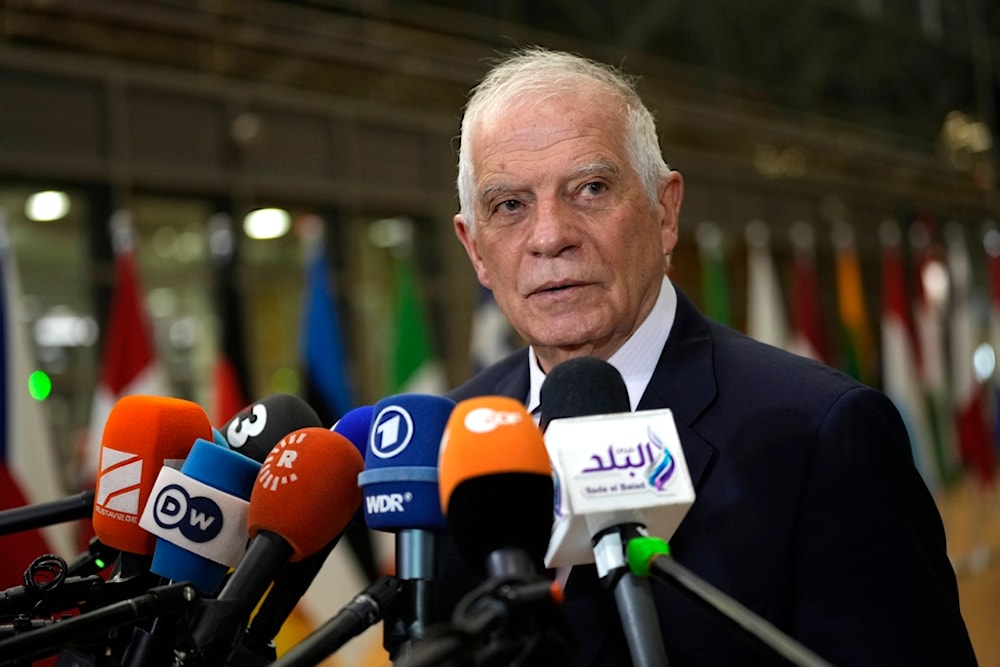EU reiterates 'two-state solution' support amid Netanyahu's rejection
If Israelis disagree with the two-state solution, discussions will ensue to explore alternative solutions, the top EU diplomat said.
-

European Union foreign policy chief Josep Borrell speaks as he arrives for a meeting of EU foreign ministers at the European Council building in Brussels, Monday, Jan. 22, 2024 (AP Photo/Virginia Mayo)
EU Foreign Policy Chief Josep Borrell stated on Monday that the European Union exclusively supports the UN-backed two-state solution as the acceptable peace process in the Gaza Strip.
The top EU diplomat said that "Israel" is invited to engage in discussions as the EU Foreign Affairs Council meets in Brussels to address the Middle East situation, including regional developments, worsening humanitarian conditions in Gaza, and the imperative to prevent a conflict spillover in the region while considering potential peace terms.
"I think that we have to stop talking about the peace process and start talking more concretely about the two-state solution process. Because 'peace' — it could be many different peaces, what kind of peace you are talking about? So let's talk about what we want to do, and what we want to do is to build a two-state solution. The way of naming it is important. So from now on I will not talk about the peace process, but I will talk about the two-state solution process," Borrell told journalists ahead of the council, adding that "Israel" is invited to participate in the discussions and present its perspective on a future peace.
"If they do not agree [Israelis on the two-state solution], we have to discuss. That is why we are here, we have to discuss even if they disagree. They have to come here and they will discuss with us and we will study which solution they have in mind," Borrell said.
Borrell also criticized "Israel's" approach to war, citing a significant civilian death toll in the Gaza Strip and asserting that it is "seeding the hate for generations."
He further noted that the council's attention to Middle East developments does not compromise its support for Ukraine.
Israeli Prime Minister Benjamin Netanyahu has frequently expressed opposition to the two-state solution, which entails establishing an autonomous Palestinian state in the West Bank and Gaza Strip.
Particularly on Saturday, the Israeli prime minister used social media to restate that his nation will not "compromise on full security control" over the entire region west of the Jordan River, even though he acknowledged that it was "contrary to a Palestinian state."
On Sunday, a report by the Financial Times revealed that a document that was circulated ahead of today's meeting, asking member-states to draft potential consequences for "Israel" in case the latter fails to embrace the two-state solution.
Read more: Europe's global reputation damaged by stance on Gaza: Politico
This comes against the backdrop of heightened tensions regarding the preconditions imposed by Saudi Arabia to reach a normalization agreement with "Israel."
The Gulf country has reiterated multiple times and through multiple diplomatic cables that the only obstacle standing in the way of normalizing relations with the Israeli regime would involve the establishment of a Palestinian state.
As a result of this, the West has been pressuring "Israel" to comply with Saudi demands, but Israeli Prime Minister Benjamin Netanyahu has been the source of frustration among allies by consistently opposing the two-state solution.
The European Union is reportedly in the process of drafting a 10-point peace roadmap and intends to garner support from the US and the Arab world.
Read more: Former Israeli chief says Netanyahu 'selling illusions'

 4 Min Read
4 Min Read










